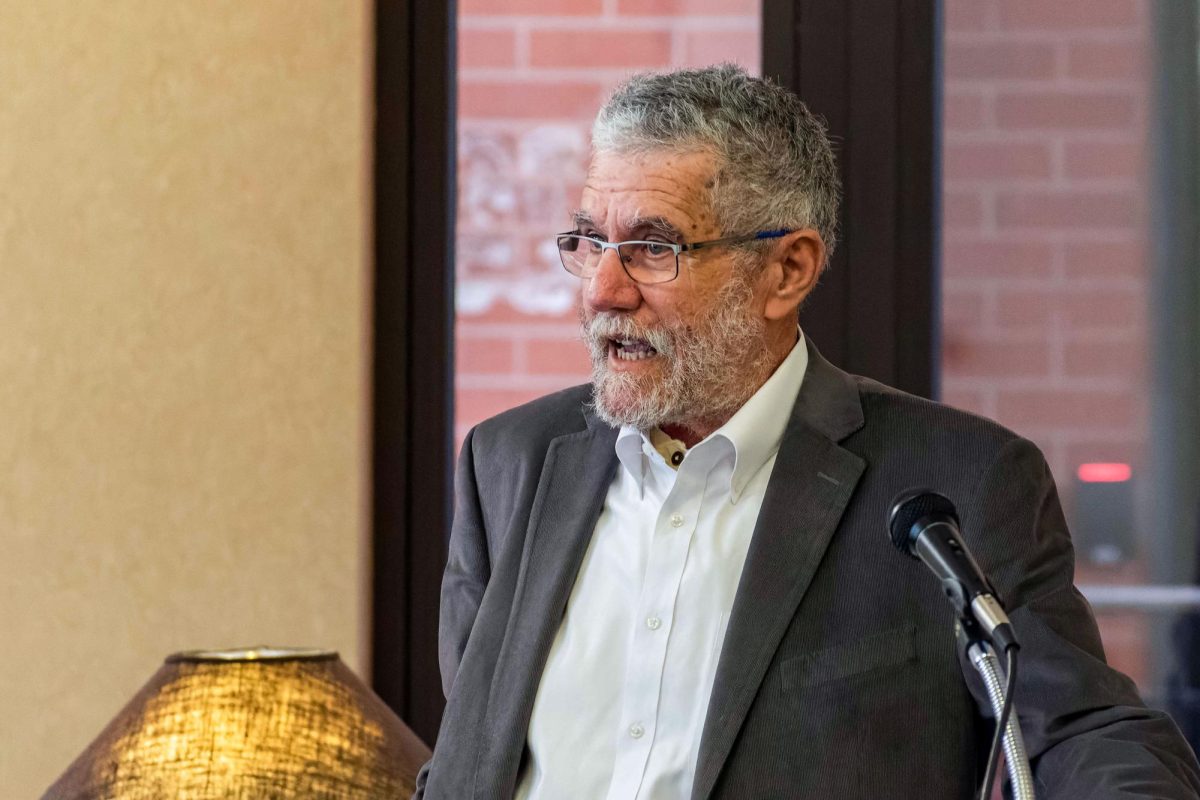An expert in copyright law shared his personal experience with music theft and proposed industry changes to support small artists at a discussion at the GW Law Tasher Great Room on Monday.
David Post, a retired Temple University law professor, said he and thousands of others have been victims of music piracy — copying and distributing music without the consent of its owner — and that the industry’s lack of financial and legal resources for small artists to reclaim their work will harm music professionals at large. The newly formed Music Law Association hosted the talk as part of its series of guest speakers.
Post said he and his long-time friend Craig Blackwell, a GW alum, had been playing together in the folk guitar duo Bad Dog since the early ’90s. He said it wasn’t until December that they discovered their music was being republished online under different names after a friend played their song “Preston” into the song-identification app Shazam on her phone at Bad Dog’s album release party. Post said he knew something was wrong when the app returned results of an identical-sounding song titled “Drunk the Wine” by an artist named Vinay Jonge.
“Long story short, all of the stuff from the album had been pirated under different names,” Post said. “The song names have been changed and the artist has been changed.”
Post said he did not have definitive proof of how the pirates stole Bad Dog’s music, but he suspected they used an automated process like artificial intelligence to victimize thousands of small artists at a time. He said Bad Dog’s songs generate only a modest income, suggesting that piracy operations like these could only be sustained by stealing from a vast number of artists simultaneously.
“I think this took planning, it takes some degree of technical expertise, and it takes having some sort of relationships of some kind with the major streaming platforms and the music distributors,” Post said.
Post said the duo was shocked to discover that fake artists like Vinay Jonge were not independently publishing their music but releasing the songs through major distributors like Warner Music Group, one of the largest record companies in the world.
He said he remembers attempting to create CDs of Bad Dog’s music through the website diskmakers.com, but was rejected because the site flagged the files as music property of Warner. Post said he suspects major distributors might financially benefit by turning a blind eye to piracy, considering their capability to detect and remove duplicate music, a practice already in place for large artists.
Post said he suspects the real perpetrators are operating internationally and are outside of the jurisdiction of United States courts. He said the pseudonyms and fake song names are generated by AI bots that analyze the lyrics of the stolen music.
Post said, instead of targeting artists that don’t exist, he thinks the most effective approach to seek justice is to pursue legal action against the distributors, like Warner Music Group.
“If you distribute copies of copyrighted material, you are liable for copyright infringement,” Post said. “And they did that.”
He said he hopes others will develop independent technology to assist small, independent artists in identifying their stolen music online. From a legal perspective, Post said the case would likely be easy for small artists to win, but identifying the music pirates as the defendants would pose a significant challenge.
“Who are the defendants? One might ask,” Post said. “Well, there’s ‘Vinay Jonge’ and ‘Arend Grootveld’ and ‘Tiara Hallmark,’ but they don’t exist.”
The New York Times featured Post and Blackwell in a story in January exploring the piracy of “music phantoms” who stole music from small artists. Post said he hopes that media attention can unite other artists facing similar situations and compel major distributors to take action.
“They don’t have immunity, I can sue them tomorrow,” Post said about the distributors. “So if I can find 10,000 other people, Warner starts to get nervous.”
Post said that a class action lawsuit would be difficult and costly to assemble. He said he thinks the most effective approach for young lawyers seeking to support small artists is to work on changing the system gradually over time working with one artist at a time, like by negotiating licensing agreements that better protect their music from piracy.
“The partner you’re working for is probably not interested in how you would reform the entire universe of copyrights. But he or she really is interested in making a difference at the smaller level,” Post said. “Change one sentence in that indemnification clause to make it stronger. That’s how you get people’s attention. If you do that, it will make the whole process work better.”
Post said that he thinks if the piracy goes unchecked, it will likely discourage small artists from sharing their work.
“The existence of this, if this thing is widespread, people are not going to want to share their stuff on the net,” Post said. “My son is a professional pianist and composer. If he puts stuff out and thinks somebody’s ripping it off and putting it out under their own name somewhere else, he’ll be a hell of a lot less likely to put it up in the first place and that’s a loss to society.”





